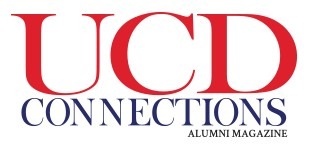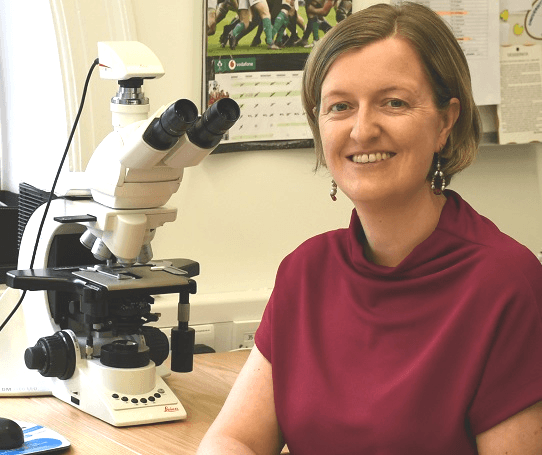Acting State Pathologist Dr Linda Mulligan was inspired to study medicine, and forensic pathology in particular, due to her fascination with detective TV shows and novels. In this Alumni Q&A, Linda discusses how she likes to unwind, a typical day as a pathologist and reminisces about her time as a medical student in UCD.
1.What was your UCD experience like – the social scene, classes, lecturers?
Our pre-med year was based in Belfield, but for the following two years we were based in Earlsfort Terrace beside the National Concert Hall. From 4th year, I was based in the Mater Misericordiae University Hospital.
I remember most of our lecturers were really good. I always wanted to do medicine so I was interested from the very beginning. Everything was new and exciting but also challenging. It is not a course that you “try out” to see if you can do it. It takes a lot of work and commitment. We didn’t have continual assessment either, so most of our marks were for the end of year exams. That was usually the most stressful time of the year.
Because we moved base so much, the social scene changed quite a bit! First year was spent frequenting the old student and sports bar on the Belfield campus. When we moved to Earlsfort Terrace, our usual watering holes were Mulligans and Hartigans across the road. They were run by a rather stern woman called Ma Mulligan. I spent most of the first year convincing everyone that we were not related!
2. What is your fondest memory from that time?
My fondest memory from UCD is the Medical Students Overseas Relief programme. I was the secretary in 4th year, and myself and five other students travelled to Lima where we brought medications for respiratory conditions as well as antibiotics (there were a lot of pollution-related illnesses and poverty in the communities on the outskirts of the city). We also brought treatments for Leishmaniasis to a health outpost in the Peruvian jungle near a small town called Ivochote. I will not forget that 12 hour journey in the 4WD ambulance. Then when we arrived, we had to enter the village by walking over an Indiana Jones-style rope bridge with caimans (a type of alligator) snapping underneath us. Our accommodation was the local mortuary – it was destiny! The Peruvian people were amazing and I am still in touch with a couple of the students who travelled there with me. A brilliant experience altogether.
3. How did you end up in your current area of work?
After my intern year in Ireland, I spent two years in clinical medicine in Perth, Australia. Following those two years, I was successful in obtaining a place on the pathology training scheme in Dublin. I finished my exams in 2014 and was looking at doing an overseas fellowship in forensic pathology when the opportunity came up in the State Pathologist’s Office. I was taken on in an acting capacity as one of the Deputy State Pathologists. After two years of training from Prof. Cassidy, Dr Curtis and Dr Bolster, I completed two forensic diplomas and am now a fully-fledged forensic pathologist.
4. What did you want to be when you began your studies and why?
I always wanted to do forensics. I was hooked on Inspector Morse, Taggart, Cracker and other detective series during my teenage years. I first realised forensic pathology was a job when I saw Scully in the X-files! I had a wild idea that I would end up being an FBI agent – ha ha! But I’m still here in Dublin.
5. What decisions have you made in your working life which were directly impacted by your time as a student?
As a student, you get immersed in the healthcare system you work in. During this time, I made the decision that I would go abroad at some stage during my career to experience a different healthcare system. When I became a consultant, I reconnected with UCD because I feel I can now contribute to the teaching of medical students. I lecture each year on the Forensic and Legal Medicine module in UCD.
6. What is the proudest moment of your career to date?
As a doctor, there are so many exams and obstacles to overcome before you achieve your consultant position. All of those are little victories. The proudest moment of my career was probably getting through my first complex homicide case and following it through to court. It’s a sort of landmark for any forensic pathologist.
7. What have been the most challenging aspects of your career?
I know everybody thinks that I should mention certain high profile or gruesome cases – and they are very difficult to deal with. However, the most challenging aspect of any consultant job is management. I don’t think we are really prepared for it as doctors and all of a sudden you find yourself in charge of a department of people waiting on you to make decisions and improve their working life! I find that quite challenging.
8. What helps you to maintain your mental-wellbeing despite the crimes you encounter in your line of work?
I think I am lucky to be one of the few people who can compartmentalise. I think all medical professionals are able to do it, but with me I can leave my cases in work when I go home (most of the time). I have a good support network with my family and friends outside of work. I also try to make time for myself every week – usually pilates, walking, going to soccer or rugby matches or the cinema. The cinema, in particular, is usually where I can leave the outside behind and forget about everything for a while! It’s my favourite pastime. I am a big fan of the Marvel movies!
9. What interests you the most about your job?
I love a good puzzle. That’s what I do every time I have a case. The information from the coroners and Gardaí, the scene visit, the medical history and the autopsy are all pieces. My job is to put them all together to get a cause of death. Every case is different. Our deaths are as individual as our lives. They each have their own challenges. My aim is to provide a comprehensive report which will provide answers for the family of the deceased, as well as to the coroners, the Gardaí and of course the criminal justice system.
10. What does your typical day look like?
Every day is different. I am very lucky that I don’t have to do the same thing all the time. We are on-call one in every three weeks (24 hours a day including weekends) so on those weeks I could end up anywhere in the country at any time! We don’t have our own mortuary so we have to travel to local mortuaries to perform cases as directed by the local coroners.
When I’m not on-call, I am usually in the office finishing reports. This entails interpreting toxicology reports, looking at microscopic slides and compiling the medico-legal autopsy report. I may also be teaching (medical students, Gardaí), promoting forensic pathology around secondary schools, advising various committees and organisations on forensic matters, dealing with the day to day management of the office or supervising medical and science students during their research attachments to the office.
11. What is life outside work like?
Busy! We have lots of extra-curricular activities in our house added to things like groceries, cleaning, laundry and the usual day to day household stuff. It keeps me grounded.
12. How has your industry changed in the last 5 years?
Forensic pathology is an ever evolving specialty. Radiology and anthropology have come more to the forefront in the last few years and there is a move to standardise autopsy practice with updated guidelines from the Royal College of Pathologist in the UK, as well as updated codes of practice. At a local level, Prof Cassidy and Dr Curtis have both retired, so there are currently some personnel changes in progress on that front in Ireland. We have also moved into new offices above the Dublin City Mortuary in Whitehall where we have our own histology laboratory – that has made a big difference to our casework.
13. How has your career impacted the way in which you understand the world?
It might seem obvious, but I think being aware of your own mortality lets you appreciate what you have in the here and now. I tend not to worry about too far into the future and try to make sure I enjoy myself in everything I do. I also know that we see a skewed version of the world, so that it is important to keep up all those activities and the support network outside of the office dynamics.
14. Where do you see your career taking you next?
I hope that with the introduction of new staff into the department, there will be more opportunities for research and self-education. I’d love to pursue an interest in toxicology and explore the possibility of doing more international work, for example with the Interpol or perhaps the International Committee of the Red Cross.
We are also hoping to establish an official training scheme for forensic pathology here in Ireland and the first step towards doing that will be to apply, with the support of the Faculty of Pathology RCPI, to the Irish Medical Council for recognition of Forensic Pathology as a medical specialty. The application will happen early next year.
15. What advice would you give to someone who is now just beginning their career?
If you are going to do forensic pathology, you must first make sure you have a basis in histopathology. As a medical student this means spending time in hospital laboratories and learning how they work. You can also speak to us here directly – our contact details are on the website: http://www.justice.ie/en/JELR/Pages/office_of_the_state_pathologist.
16. What is the best piece of advice you’ve ever been given?
There are two really; manners cost nothing and always keep your head!
In other words, think before you act and try to remain calm in the face of adversity. Also, smile while you are doing it! I have always found that approaching things in a calm, positive manner is more productive than losing the head!
17. What is the most useful book you’ve read?
Without a doubt, Mindset by Dr Carol Dweck. I am not really into self-help books (I prefer Science Fiction and Fantasy – shocker I know!), but this one was recommended to me and it totally changed my perspective of myself and how I generally approach life. Revolutionary.
www.Linkedin.com/in/dr-linda-

